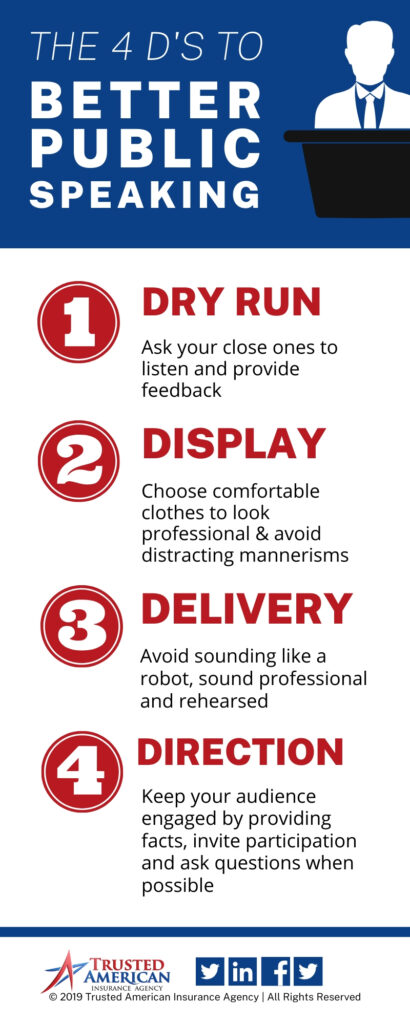Imagine this: you are at your next Medicare seminar. It’s a great turnout – the most you’ve had yet! You begin talking to the attendees and you think to yourself, “I’m killing it!” Everything you had in mind to discuss is sliding out like butter. However, as your presentation comes to a close, you realize no one is interested in making an appointment with you. In disbelief, you wonder what went wrong.
They seemed so eager when they arrived! Now? Now they look quite disinterested in what you have to offer. You managed to get a few appointments scheduled, but not nearly as many as you hoped.
If you can relate to this scenario, there is hope! You know your stuff… you just need to become a better public speaker.
Why is it important to become a better public speaker?
Improving your public speaking skills allows the individuals at your Medicare seminars to retain your content much better by being more engaged with that you have to say. It also makes you seem more qualified to speak on the subject – something you definitely need if they are to look to you like an expert on the matter. In short, becoming a better public speaker will allow you to stand out from the competition, bringing in more sales.
The 4 Ds To Becoming a Better Public Speaker
1. Dry Run
Becoming a better public speaker will require preparation. There’s no way around it. You can’t just walk into that seminar without a game plan. You must be incredibly familiar with the subject matter and what will be presented at this event, specifically. The best way to do that is doing a dry run.
- Practice speaking in front of friends & family, who can provide valuable feedback.
- Practice by speaking into a camera and watching the recording after the fact to look for ways to fix your flaws and improve your game.
 2. Display
2. Display
How you display yourself while speaking plays a huge role in becoming a better public speaker. Watch your hand gestures, your posture and the use of ‘filler words’ such as “like”, “um”, and “uh.” Even if you know Medicare like the back of your hand, saying filler words makes you seem unprepared and unprofessional. So, uh, stop doing this.
- Try practicing speaking to yourself in the mirror to see what you look like when you speak and then make adjustment.
- Remember how we suggested to record yourself? Watch it back and tally up how many filler words you used so you can be aware and try to eliminate them.
- Also, check out this blog on what to wear.
3. Delivery
When speaking at your Medicare seminar, the last thing you want is to sound bored and monotonous. (Medicare is already boring!) Instead, sound passionate about the subject matter. Additionally, try not to sound like you are reading off a script because it makes you seem unfamiliar with the topic (not exactly comforting for Medicare enrollees). Instead, speak as if you’re having a conversation with the audience. This simple trick is key if you want to be seen as a better public speaker.
4. Direction
Direct your attention to the attendees during your Medicare seminar. Do they seem fidgety? Do they look confused? Bored? Your audience’s responses are a dead giveaway to knowing you if you are being effective or boring. Here are some simple ways to keep them engaged:
- Provide facts & figures.
Providing facts and figures is proven to increase your audience’s retention by 20%. (See what I did there?)
- Allow brief moments of silence in between statements.
This allows your audience to assimilate the information better. Plus, speaking slowly and pausing makes you come across as a more trustworthy and genuine person.
- Invite participation.
It is proven that without participation, audience engagement drops by 14%. So keep those people engaged and interested by asking them questions throughout the seminar.
So, here you are, standing at the crossroads. Look, if this seems too daunting to you, then keep on winging it. I’m sure you’re getting some results from your seminars as you are right now. But, if you want to really grow your book of business and increase your sales, start here. Take the step forward and use the tips on this page to improve your public speaking. Regardless of how embarrassing they may seem, try them. Practice, practice, practice. There’s just no other way to becoming a better public speaker.
